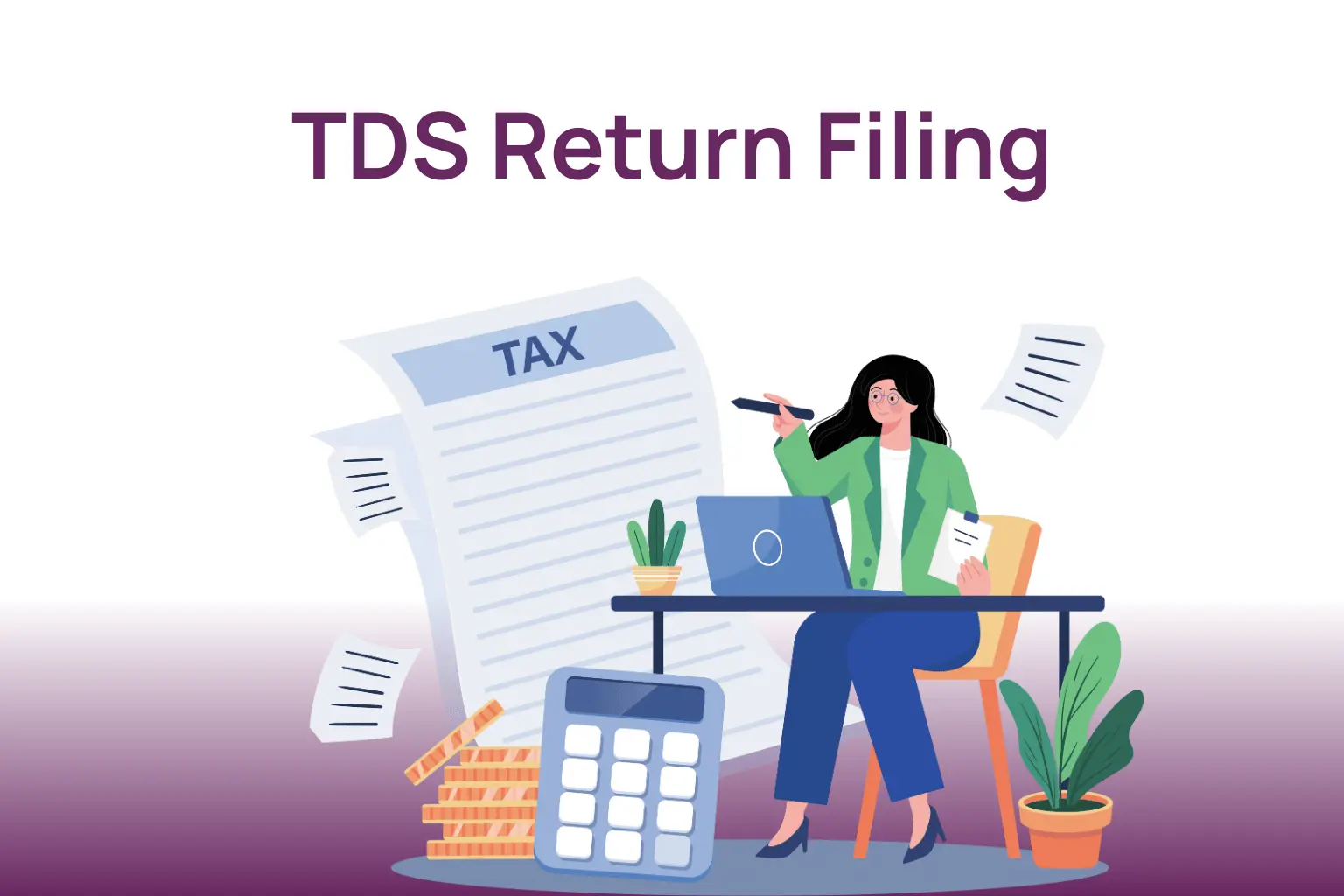
TDS (Tax Deducted at Source) is a system where tax is deducted by the payer before making payments such as salaries, interest, rent, or professional fees. This deducted amount is then submitted to the government.
For companies, filing TDS returns is a legal requirement. These returns are periodic statements submitted to the Income Tax Department, detailing the tax deducted and paid to the government. TDS returns ensure transparency and proper record-keeping of deductions.

TDS returns are typically filed quarterly, and failing to file on time can result in penalties and interest. Timely filing helps your company remain compliant with tax laws.
Any entity that is required to deduct tax at source (TDS) while making payments to individuals or entities must file TDS returns. This includes:
- Companies – Whether private or public, all companies must file TDS returns if they are deducting tax on payments like salaries, rent, interest, etc.
- Government Departments and Agencies – Government bodies also need to file TDS returns for any TDS deducted by them.
- Partnership Firms – If a partnership firm is deducting TDS, it must file the returns.
- Individuals and HUF (Hindu Undivided Families) – If they are responsible for TDS deductions, such as on payments to contractors, professionals, or rent, they too are required to file TDS returns.
- Cooperative Societies – These are also required to file TDS returns if they deduct tax on payments like salaries, interest, etc.
TDS return filing is mandatory for any entity that deducts tax at source as part of its business or professional operations, ensuring compliance with the Income Tax Act.
Types of TDS Returns
These are the types of TDS Returns.
Form 24Q (TDS on Salaries)
Form 24Q is used for filing TDS deductions on salary payments made to employees. Companies and employers must file this return quarterly, providing details of the TDS deducted from employee salaries. It includes the total salary paid, tax deducted, and the PAN of employees. Timely filing ensures compliance with tax regulations.
Form 26Q (TDS on Payments other than Salaries)
Form 26Q is used to report TDS deductions on payments made to contractors, professionals, and other service providers. This return is filed quarterly and includes details of the TDS deducted on payments such as fees, commissions, and rent. It is necessary for businesses that deduct tax on non-salary payments.
Form 27Q (TDS on Payments to Non-Residents)
Form 27Q is filed when TDS is deducted from payments made to non-residents or foreign companies. This includes income paid to foreign nationals such as interest, royalties, or other payments. It is filed quarterly and provides details on the tax withheld and remitted to the government.
Form 27EQ (TCS - Tax Collected at Source)
Form 27EQ is used for reporting Tax Collected at Source (TCS) on certain sales and transactions. This return is filed by entities who collect tax on goods sold, such as scrap, minerals, or timber. It ensures the tax collected is reported and paid to the government.
Form 16 and Form 16A (TDS Certificates)
Although not a return, Form 16 and Form 16A are issued as certificates of TDS deducted. Form 16 is issued for TDS on salaries, while Form 16A is issued for TDS on non-salary payments. These forms serve as proof of tax deducted and can be used by the taxpayer while filing their income tax return.
Why TDS Return Is Mandatory?
TDS return is a mandatory requirement for several key reasons

Legal Compliance
Filing TDS returns ensures adherence to the Income Tax Act, 1961, maintaining your business’s legal standing.

Transparency & Record-Keeping
It provides a clear record of tax deducted, ensuring transparency for both the business and tax authorities.

Avoid Penalties
Timely filing prevents penalties and interest for late submission, avoiding unnecessary financial burden.

Tax Credit for Payees
TDS returns help recipients claim the tax deducted against their overall tax liability when filing their returns.

Audit Trail
Filing creates an official trail of tax payments, making it easier for authorities to verify and audit transactions.

Ensures Accurate Tax Payment
It ensures the correct tax amount is deducted and paid to the government, avoiding discrepancies and legal issues.
Due Date for TDS Filing and Payments

TDS must be deposited with the government on or before the 7th day of the month following the month in which tax is deducted. For example, if tax is deducted in April, the TDS payment must be made by May 7th.
Note: In case the deduction is made in the month of March, the payment must be made by April 30th.
TDS returns must be filed quarterly for most entities. The due dates for filing TDS returns (Form 24Q, 26Q, 27Q, etc.) are as follows:
- Quarter 1 (April – June): July 31st
- Quarter 2 (July – September): October 31st
- Quarter 3 (October – December): January 31st
- Quarter 4 (January – March): May 31st
These due dates are applicable for TDS returns of salaried employees, contractors, professionals, etc. If the due date falls on a weekend or public holiday, the filing can be done on the next working day.
Required Documents for TDS Filing
To ensure a smooth and efficient process for filing TDS, the following documents are required.
Required Documents
View the documents required for TDS Filing.
- TAN Login Details
- TDS Payment Challans
- Details of Deductions: Date of deduction, nature of payment, and the PAN of the deductee
- TAN and Challan Details
Our TDS Pricing
Growth
- TAN registration
- One year TDS return filing
- Up to 300 entries annually
- Form 16A certificate generation Quarterly
- Form 16 certificate generation annually for 20 employees
Elite
- TAN registration
- One year TDS return filing
- Up to 500 entries annually
- Form 16A certificate generation Quarterly
- Form 16 certificate generation annually for 40 employees
Frequently Asked Questions
Here are the answers of the questions we received frequently.
TDS returns must be filed quarterly. The due dates for each quarter are generally:
- 30th April (for Q1: April-June)
- 31st July (for Q2: July-September)
- 31st October (for Q3: October-December)
- 31st January (for Q4: January-March)
The most commonly used forms for filing TDS returns are Form 24Q for salary payments, Form 26Q for payments other than salary, Form 27Q for non-resident payments, and Form 27EQ for TCS (Tax Collected at Source) returns.
If you miss the TDS filing deadline, you will face penalties and interest charges. The penalty is ₹200 per day for delayed filing, and interest is charged at 1.5% per month on the TDS amount due.
A TDS challan is a payment receipt issued when you deposit the deducted TDS amount with the government. It contains details like the payment made, the nature of the transaction, and the total TDS paid.
If you make a mistake in your TDS return, you can file a corrected return by submitting a revised return with the same Form number. This will update the records and correct the discrepancies.
eTaxcart simplifies the entire process of TDS return filing, from preparing and filing returns to providing you with TDS certificates and ensuring all legal requirements are met. Our team handles everything, so you can focus on growing your business without the worry of TDS compliance.
Why Choose Us for TDS Return Filing?
At eTaxCart, our mission is to make tax and compliance stress-free — so you can focus on growing your career, your business, or your next big idea.

Simple and Efficient Process
We simplify the TDS return filing process, ensuring it’s quick and hassle-free, so you can focus on running your business.

Affordable and Transparent Fees
Our TDS services are cost-effective, providing excellent value while ensuring full compliance with tax laws.

Expert Support
Our experienced team offers expert guidance throughout the process, ensuring your TDS filings are accurate, timely, and compliant.




